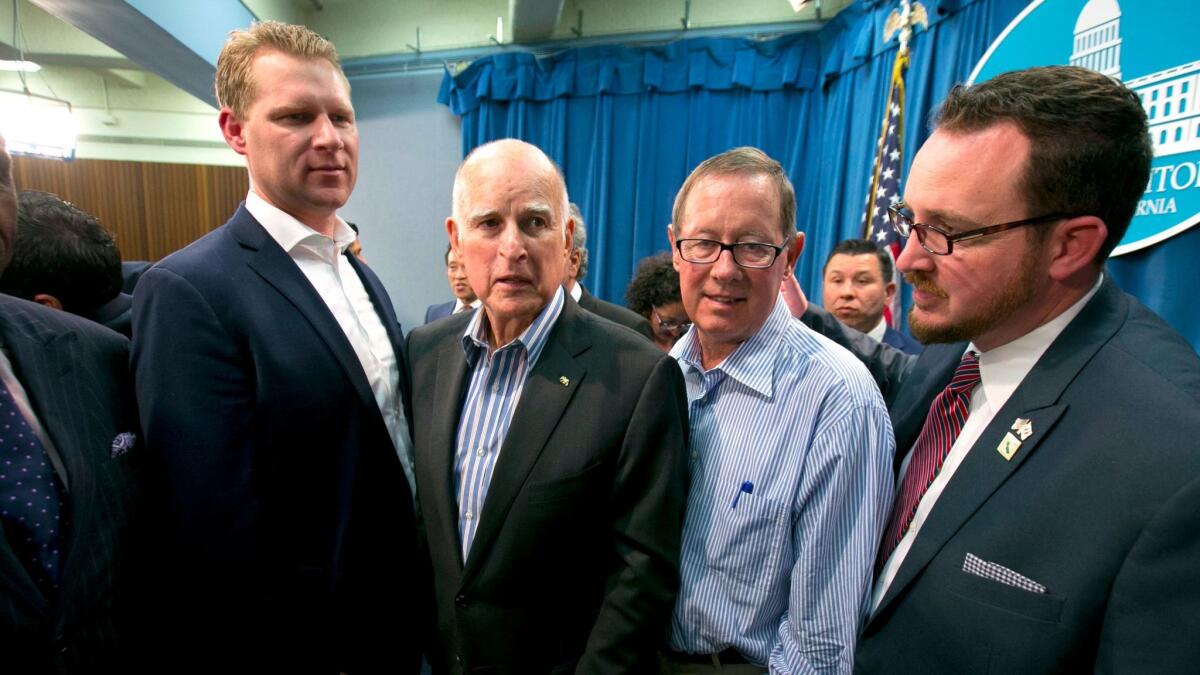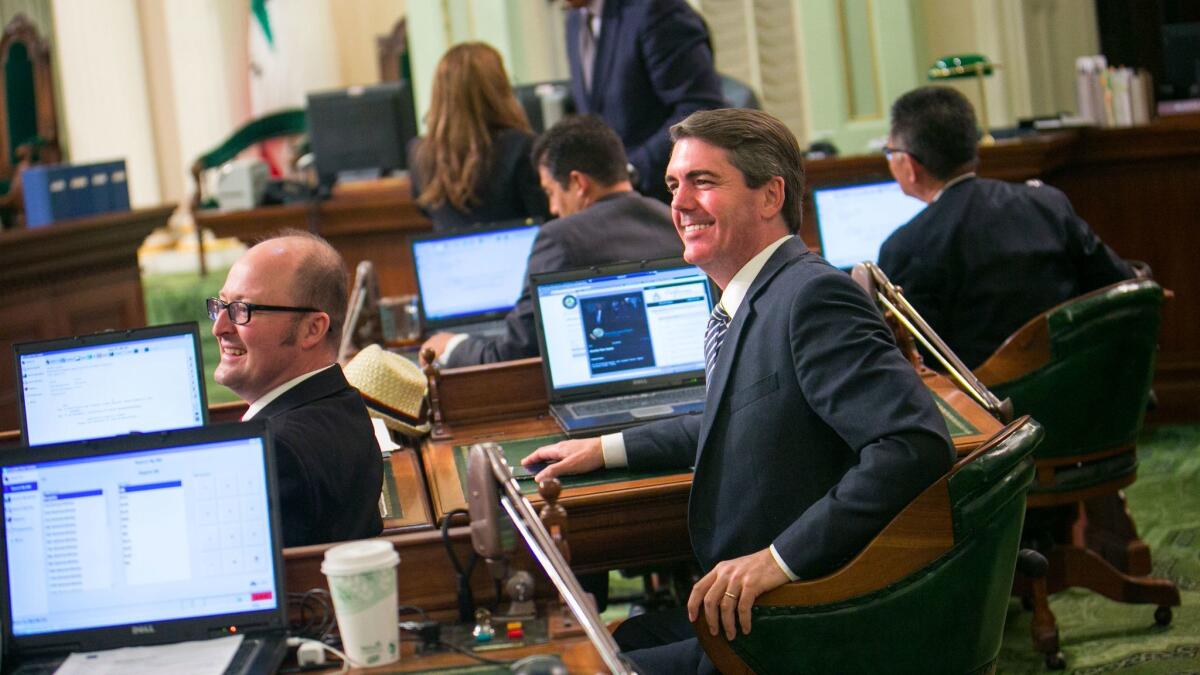Eight Republicans backed Jerry Brown’s climate change bill — here’s what that means for their political futures

- Share via
How peculiar are the politics of climate change in California? Just look at this week’s vote on cap and trade, which saw a Republican former grape farmer from Modesto and a Democratic former math teacher from Bell Gardens aligned against a mild-mannered Santa Cruz liberal and a provocative anti-tax crusader from Huntington Beach.
It’s not often that a contentious vote yields a roll call as unusual as the one Monday, when lawmakers approved a measure to extend the life of the state’s cap-and-trade program, which requires companies to purchase permits to emit greenhouse gases.
But when aforementioned lawmakers Sen.
Monday’s vote put an end to months of backroom negotiations, but the aftermath rippled throughout the state Tuesday.
Here’s how the political repercussions are playing out.

Fissures among Republicans
Eight GOP votes were pivotal in passing the cap-and-trade bill and gave Brown’s plan an imprimatur of bipartisanship that is rare on big-ticket legislation — particularly on bills concerning climate change.
"When you can lock something in with support of Republicans and Democrats, it has durability,” Brown said Monday night.
Although cap and trade may be on solid ground, those GOP members now find themselves in thorny territory.
The Republican base largely despises the measure, calling it burdensome regulation that will increase gas prices. Conservative talk radio and bloggers have railed against cap and trade, and the Wall Street Journal editorial board lashed out Tuesday at GOP lawmakers’ “political self-sabotage and voter betrayal.”
Assemblyman Rocky Chávez (R-Oceanside) said he expected more of his colleagues — as many as 12 GOP lawmakers total — to join him in backing the bill.
But, he said, in the run-up to the vote, opposition from established conservative groups, such as the anti-tax Howard Jarvis Taxpayers Assn., and an entreaty to Republican legislators from House Majority Leader Kevin McCarthy (R-Bakersfield) and three other GOP congressmen urging a “no” vote may have spooked some would-be supporters.
“That’s a powerful letter,” Chávez said. “These are congressional Republicans who have great stature within the state and impact some of these members’ districts.”
Hoping to tamp down the backlash, Assemblyman Marc Steinorth (R-Rancho Cucamonga) posted his cellphone number on social media Tuesday, inviting constituents to call and discuss their concerns about his “aye” vote. By lunchtime, he estimated that he had received around 50 calls.
“They feel betrayed, they feel hurt, they feel angry. What they’re hearing on talk radio — they believe it,” Steinorth said.
His pitch: Making note of the state’s existing aggressive greenhouse gas reduction targets enshrined in law, and countering that without cap and trade, the state could pursue more direct regulation to reduce emissions — which could be costlier to businesses and consumers.
But with some of his GOP colleagues launching a salvo of criticism at the bill, Steinorth acknowledged, “It’s a very hard situation.”
Much of the ire so far has been focused on Assembly GOP leader Chad Mayes (R-Yucca Valley), who has been the most visible of the Republican supporters.
“It was poor judgment, bad leadership, to spike the ball like that in the face of widespread opposition within his party,” said Harmeet K. Dhillon, a San Francisco lawyer and a Republican National Committee official.
Allen, who recently launched a bid for governor and came out forcefully against the measure, said there was a “clear division” in the Assembly GOP caucus, adding, “I think Mayes’ leadership may very well be in jeopardy.”
Mayes’ office said he wasn’t bothered by the scrutiny of his stance.
“That’s what leaders do,” said Joe Justin, Mayes’ chief of staff. “They take arrows to defend their members.”
For me, there was just too much given away
— Assemblyman Mark Stone (D-Scotts Valley), who voted against the cap-and-trade bill
For Democrats, dissent on the left
For all the attention paid to Republicans, the cap-and-trade measure was carried largely by Democrats, who overwhelmingly control the balance of power in the Capitol.
Still, there were notable dissensions among the ruling party. Four Democrats voted no on the measure — one of those lawmakers, Assemblywoman Sharon Quirk-Silva of Fullerton, switched from abstaining to ”no” after the floor vote — and Assemblywoman Sabrina Cervantes of Riverside abstained.
Stone said the legislation aligned too much with business demands to win his vote.
“For me, there was just too much given away,” Stone said. “I feel we got kind of rolled, if you will, where the priorities of the oil industry really won out.”
But Stone said the cap-and-trade negotiations marked a significant milestone for the more liberal Democrats, who at times have grumbled about being taken for granted when it comes to passing tough bills.
“This is the first time that progressives haven't said, 'We're in, we're in, we're always in,’” Stone said.
With progressive pushback, the governor’s office backed a companion measure to improve local air quality and assured lawmakers that the next item on the to-do list was affordable housing.
That was little comfort to environmental justice groups, which focus on contamination in communities. Those advocates, who were ascendant after notching wins in last year’s debate on climate bills, savaged both the cap-and-trade and air quality measures as insufficient.
"Instead of taking a giant step forward, we have chosen instead to shuffle backward,” Veronica Garibay, the co-director of the Leadership Counsel for Justice and Accountability, said in a statement.
Liberal Democratic lawmakers on social media fended off swipes for being too cozy with industry.
Although environmental justice advocates stewed, some took heart in noting that lawmakers were promising the air quality measure was a “down payment” for future action.
“If anything, the fact that they're acknowledging that there could've been more that they did is a statement to the growing influence that the environmental justice movement and those impacted communities are having in the Capitol,” said Parin Shah, senior strategist at the Asian Pacific Environmental Network.
Times staff writer Patrick McGreevy in Sacramento contributed to this report.
ALSO
GOP establishment figures Pete Wilson and George Shultz endorse California cap-and-trade plan
Here's what to watch for in the vote to extend California's cap-and-trade program
Get the L.A. Times Politics newsletter
Deeply reported insights into legislation, politics and policy from Sacramento, Washington and beyond. In your inbox three times per week.
You may occasionally receive promotional content from the Los Angeles Times.








